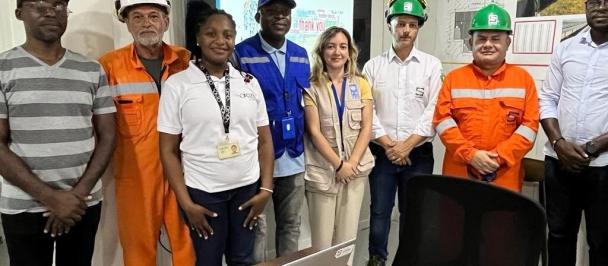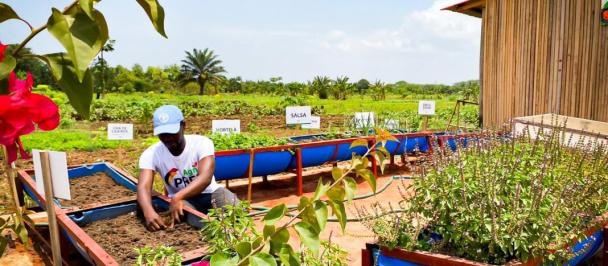Harnessing the Power of Collective Intelligence in Employment Learning and Coordination
28 de Novembro de 2023

@ UNDP Angola, 2023
In the pursuit of national development, the Government of Angola recognizes the pivotal role of human capital and youth employment in driving economic diversification. This acknowledgment is a central pillar of the National Development Plan 2023-2027. As Angola seeks to transform its economic landscape and create opportunities for its youth, a systemic approach to employment creation is essential. This approach requires not only the commitment of the government but also the active involvement of donors, development partners, and various stakeholders.
In this blog post, we delve into the Employment Learning & Coordination Collective Intelligence initiative that brings together key stakeholders to generate insights, learnings, and collective understanding of the challenges and opportunities in Angola's employment landscape. We'll explore the key statistics, emerging insights, system impacts, and the tangible products and activities being developed to address unemployment and create a brighter future for the country.
Collective Intelligence and Coordination
System transformation requires strong partnerships and coordinated action. This can best be achieved through collective thinking and learning. To facilitate this, the UNDP and the EU have joined forces to establish an informal Development Partners Learning and Coordination Working Group. This group held, in September 2023, the first collective intelligence session to gather knowledge about global initiatives around employment, the future of work and entrepreneurship.
The objectives of these sessions are to support the Government of Angola in addressing the challenges of job creation by bringing together Employment and Future of Work systems stakeholders. The aim is to generate relevant insights from their on-the-ground experiences and create a collective understanding of the changes that are shaping the Employment and Future of Work context.
Key Statistics on Employment in Angola
It is essential to understand the current state of employment in Angola. Data from the INE employment survey 3Q 2022 and World Bank highlight the urgent need for a comprehensive approach to job creation and employment diversification. However, this is a complex issue that cannot be addressed in isolation. It requires a systemic approach, considering various interconnected factors such as the structure of the economy, the capacity of the workforce, and the available infrastructure and resources.
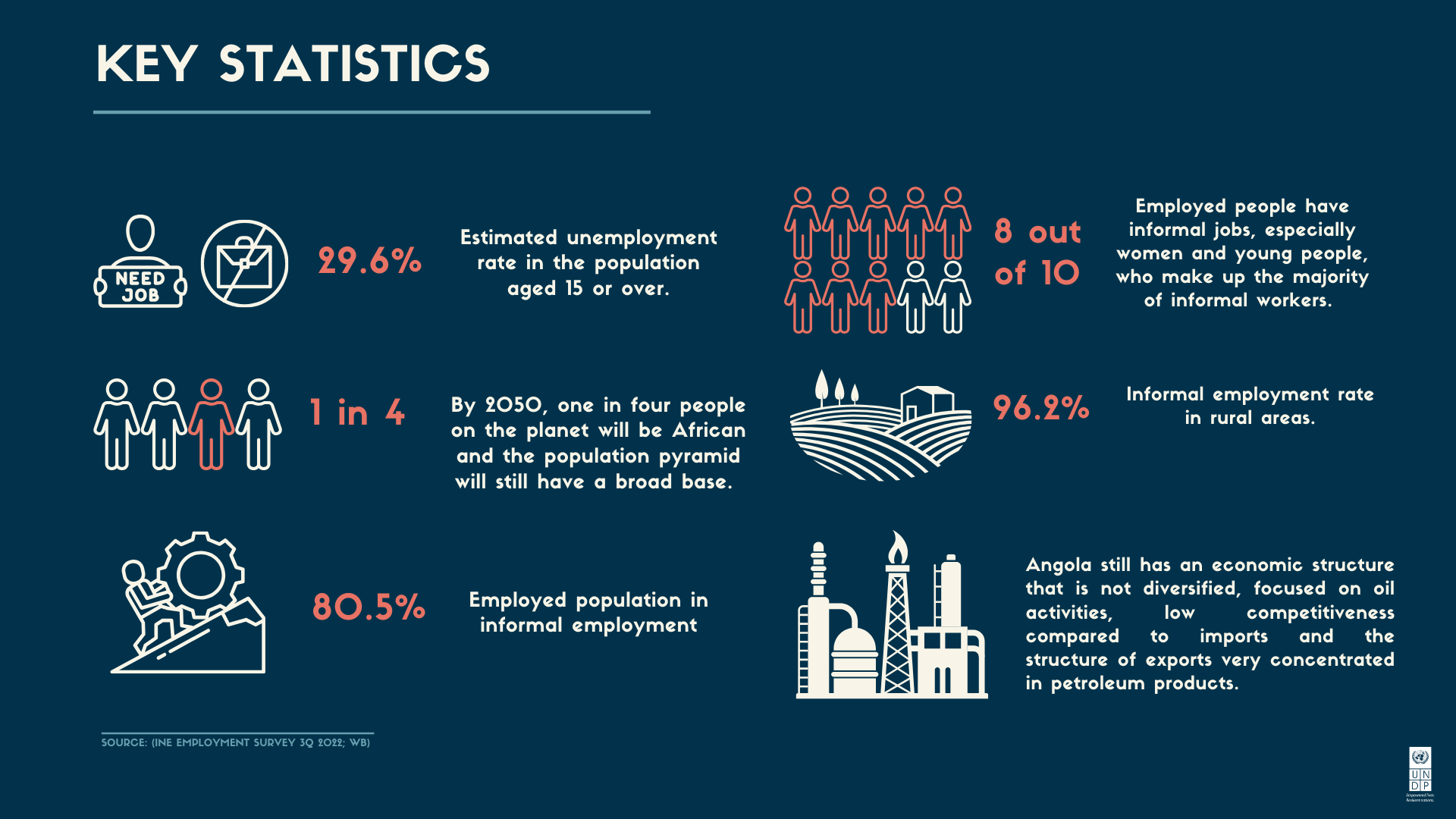
Key statistics | @ UNDP Angola, 2023
Collective Intelligence Session1 - September 2023
The first session of the Employment Learning & Coordination Collective Intelligence initiative brought together prominent organizations such as AFD, JICA, USAID, World Bank, FAO, ILO, EU, and UNDP to address the critical challenges of job creation and employment. The session focused on observing current efforts, and taking stock of what is being done and key learnings by different stakeholders. The session aimed to analyze common challenges, identify synergies and interconnections in the system, and identify potential entry points to improve impact, complementarity, and coordination in the support to accelerate employment and job creation.
To support the learning process, three guiding questions designed to help keep the focus on "why" we were doing this, and get the most learning and lessons learned from the group:
- What problem related to employment is your organization working on or trying to solve and why is this problem relevant now?
- What solution is the project bringing to the problem, and how will this solve it?
- What have you learned? What is working and what is not working? Why?
The session resulted in several emerging insights. These include the need to prioritize gender in projects, the need for more data for collaboration and planning, the need to rethink capacity building, the need to unlock the private sector role, and the need to align future skills with diversification and green transitions.
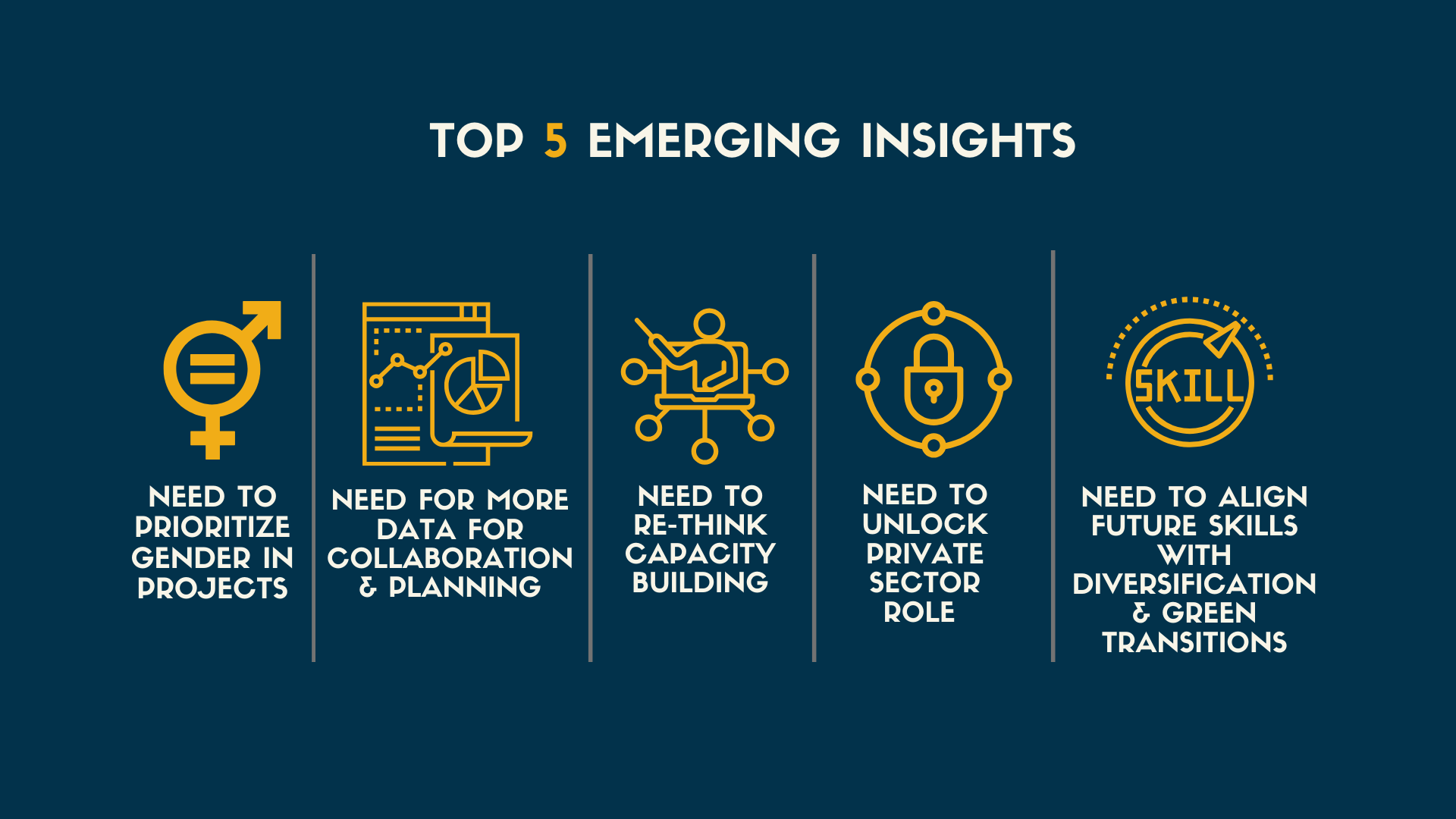
Top 5 emerging insights | @ UNDP Angola, 2023
System Impact
The impact of efforts in values and mindsets is currently weak, which is essential for future transformations in employment. While there have been significant policy and regulatory initiatives, they might not deliver short-term results or flexibility for experimentation. Data collection and sharing also require improvement to enable decentralized planning and inclusivity.
Focus areas highlighted the need for prioritizing green transitions, decentralized economies, and future skills education that aligns with diversification priorities. Despite the efforts that have been made, there is still room for improvement in terms of aligning initiatives and policies.
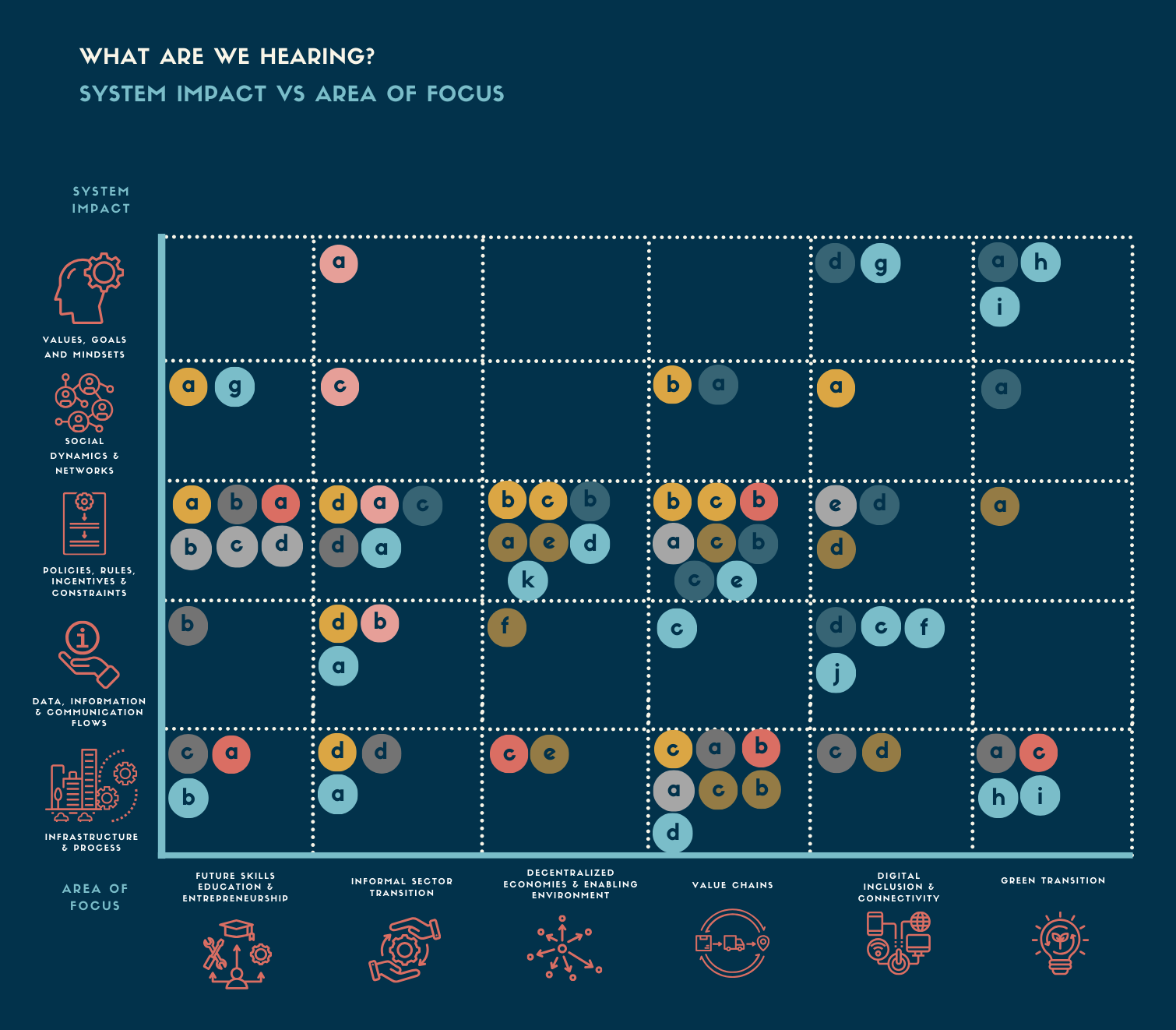
System impact vs area of facus | @ UNDP Angola, 2023
Tangible Products and Activities
Government and partners have initiated several programs to address employment challenges:
1. Reconversion of the Informal Economy Program (PREI): This program has influenced the perception of informality and legitimacy of informal jobs. However, further integration, impact, and incentives for workers are necessary.
2. Cooperatives: Working with cooperatives appears to be a positive strategy, offering support to those who need it the most.
3. Start-up Ecosystem Support: Policies and programs are being developed to support the start-up ecosystem, which can play a pivotal role in generating employment opportunities.
4. Digital Inclusion: Digital inclusion initiatives have yielded positive results. Expanding these initiatives requires a comprehensive strategy aligned with diversification goals.
5. Internship Programs: Initiatives providing on-the-job experience for youth after technical or professional training are proving effective in helping them secure employment.
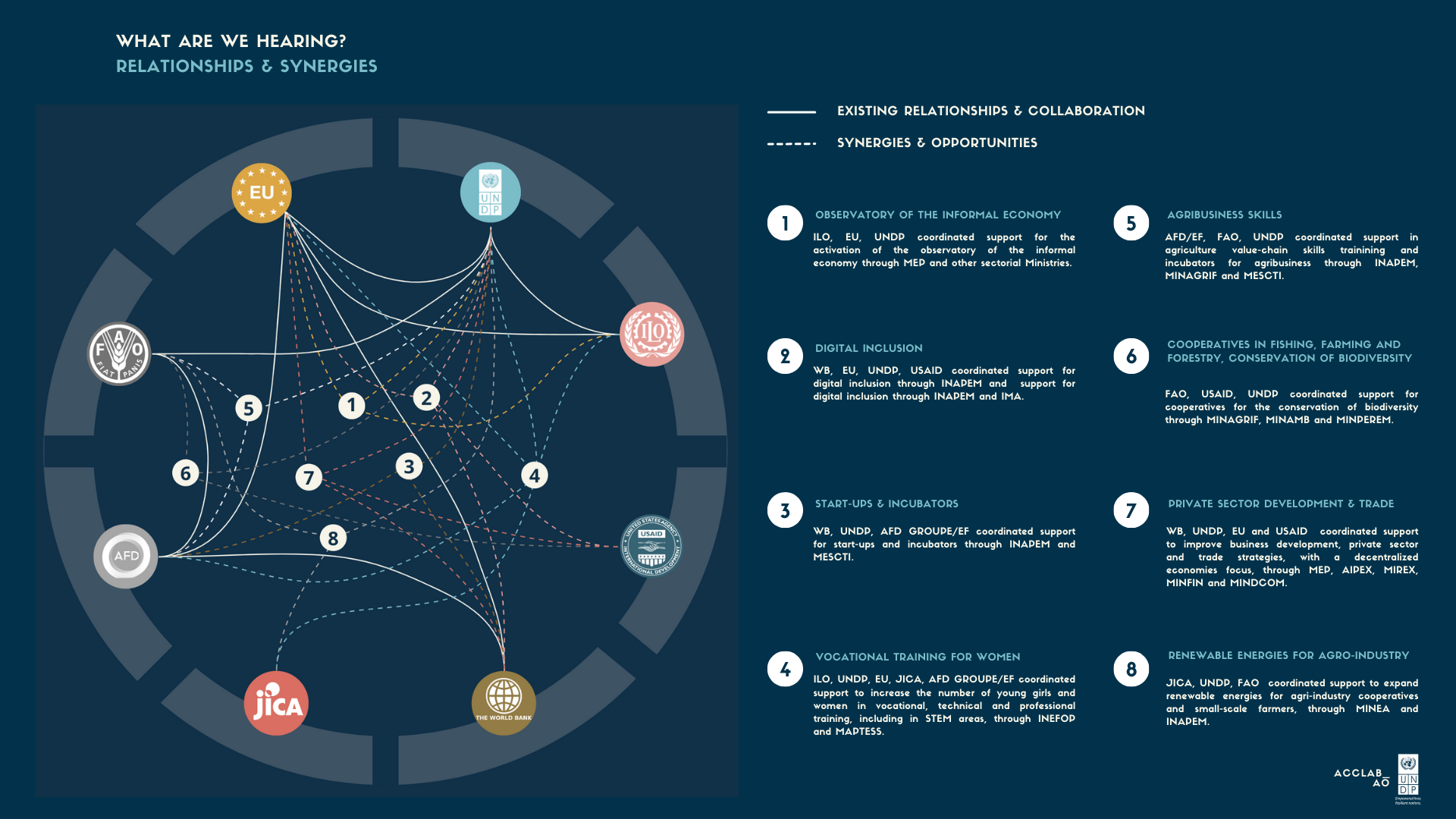
Relationships & synergies | @ UNDP Angola, 2023
Capability, Organizational, and Behavioral Changes
Key employment stakeholders in Angola are witnessing several changes:
1. Innovation and Digitalization: The public sector and youth are increasingly open to innovation and digitalization.
2. Enabling Business Environment: Efforts have been made to create an enabling environment for businesses, though constraints remain, especially for MSMEs.
3. External Investment: Angola is becoming more open to external investment, which can drive economic growth.
4. Capacity Constraints: Entrepreneurs often face technical and financial capacity constraints. Addressing these limitations is essential for their business sustainability.
5. Private Sector Engagement: The private sector is showing a growing interest in actively contributing to development.
Non-obvious Dynamics
Some non-obvious dynamics are emerging in Angola's communities:
1. Agriculture as a Viable Option: More people are considering agriculture as a potential source of income and livelihood, driven by the narrative of economic diversification.
2. Emigration Trend: Despite efforts to improve opportunities for youth, an emigration trend is developing due to high unemployment.
Reflection
We observed that spaces like this are necessary, which allow sharing experiences, and lessons learned. In two and a half hours it was possible to put together intelligence, using new methodologies and in an agile and innovative way.
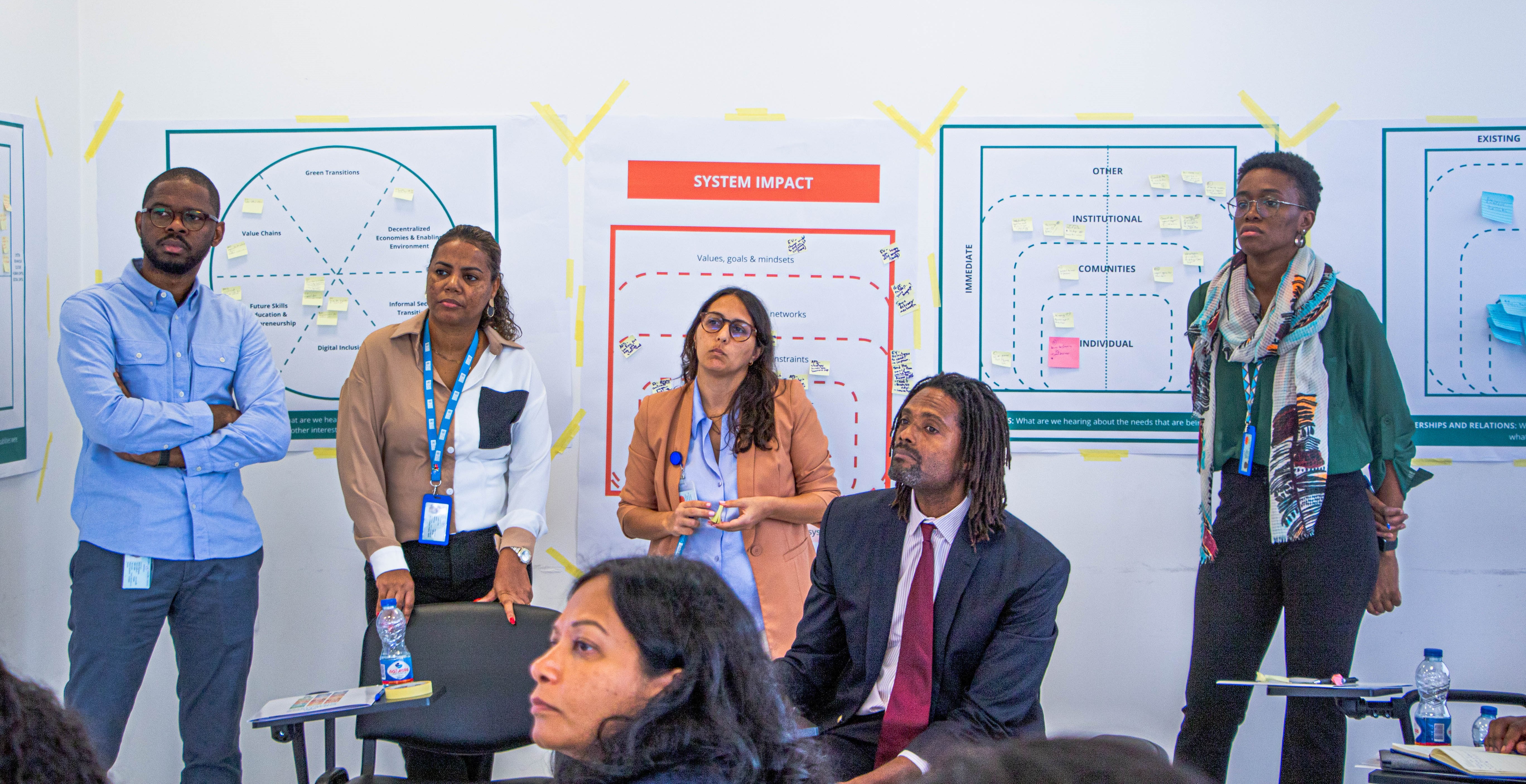
Photo of the event | @ UNDP Angola, 2023
The Employment Learning & Coordination Collective Intelligence initiative is set to continue its work, with a meeting scheduled for the last week of January 2024. The following session will be thematic, and the group will delve deeper into one of the key areas identified and discuss potential actions and partnerships to strengthen the working group.
In conclusion, addressing the complex challenges of employment in Angola requires collective intelligence, collaboration, and a commitment to transforming mindsets and systems. As the nation strives for economic diversification, these initiatives are essential for a brighter and more prosperous future for all Angolans.

 Locations
Locations

